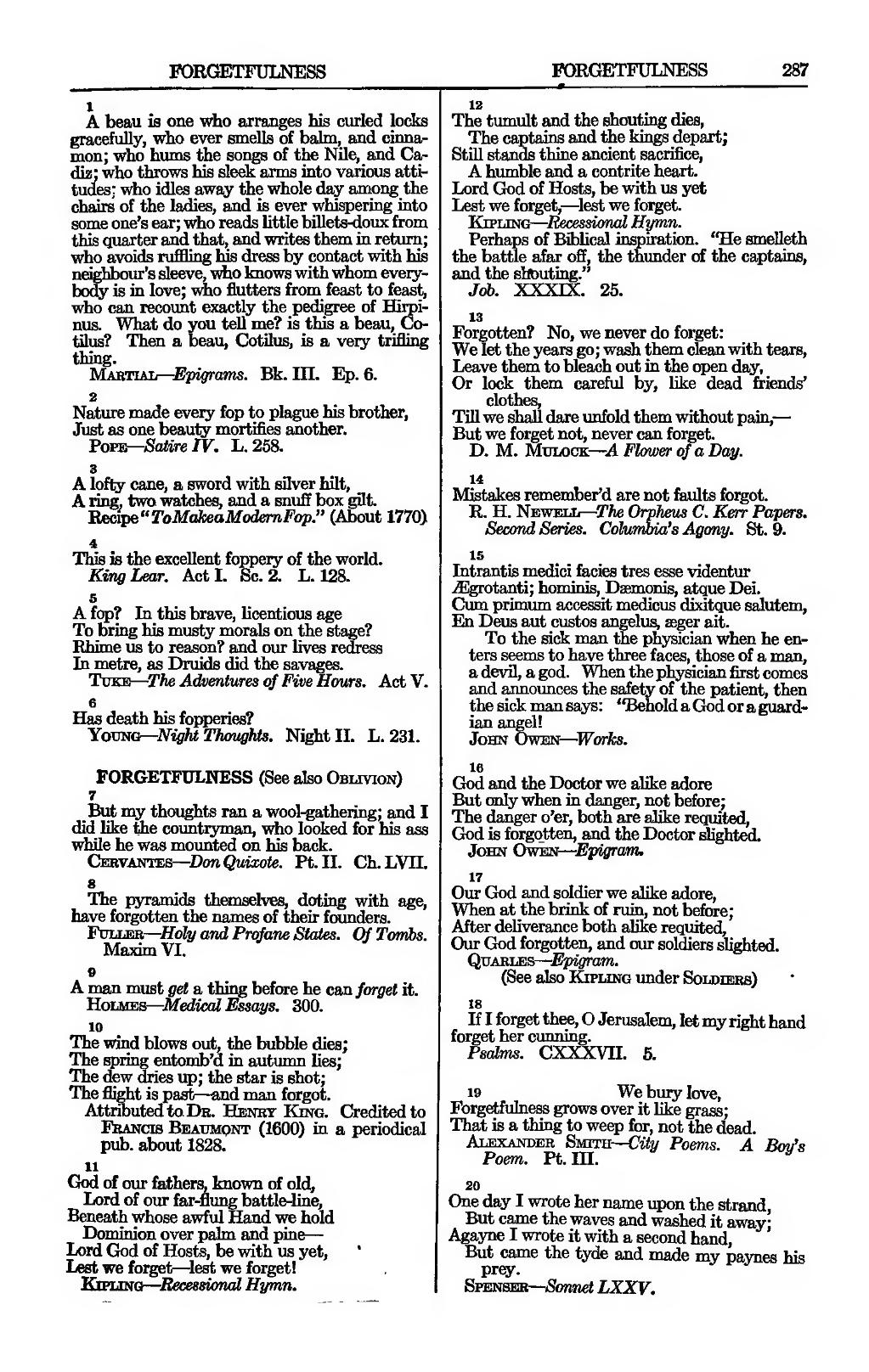Martial—Epigrams. Bk. III. Ep. 6.
Nature made every fop to plague his brother,
Just as one beauty mortifies another.
| author = Pope
| work = Satire IV. L. 258.
A lofty cane, a sword with silver hilt,
A ring, two watches, and a snuff box gilt.
King Lear. Act I. Sc. 2. L. 128. </poem>
A fop? In this brave, licentious age
To bring his musty morals on the stage?
Rhine us to reason? and our lives redress
In metre, as Druids did the savages.
FORGETFULNESS
(See also Oblivion)
But my thoughts ran a wool-gathering; and I
did like the countryman, who looked for his ass
while he was mounted on his back.
| author = Cervantes
| work = Don Quixote.
| place = Pt. II. Ch. LVII.
The pyramids themselves, doting with age,
have forgotten the names of their founders.
Fuller—Holy and Profane States. Of Tombs.
Maxim VI.
o
A man must get a thing before he can forget it.
Holmes—Medical Essays. 300.
The wind blows out, the bubble dies;
The spring entomb'd in autumn lies;
The dew dries up; the star is shot;
The flight is past—and man forgot.
Attributed to Dr. Henry King. Credited to
Francis Beaumont (1600) in a periodical
pub. about 1828.
God of our fathers, known of old,
Lord of our far-flung battle-line,
Beneath whose awful Hand we hold
Dominion over palm and pine—
Lord God of Hosts, be with us yet,
Lest we forget—lest we forget!
Kipling—Recessional Hymn.
The tumult and the shouting dies,
The captains and the kings depart;
Still stands thine ancient sacrifice,
A humble and a contrite heart.
Lord God of Hosts, be with us yet
Lest we forget,—lest we forget.
Kipling—Recessional Hymn.
Perhaps of Biblical inspiration. "He smelleth
the battle afar off, the thunder of the captains,
and the shouting."
Job. XXXIX. 25.
Forgotten? No, we never do forget:
We let the years go; wash them clean with tears,
Leave them to bleach out in the open day,
Or lock them careful by, like dead friends'
clothes,
Till we shall dare unfold them without pain,—
But we forget not, never can forget.
D. M. Mulock—A Flower of a Day.
Mistakes remember'd are not faults forgot.
R. H. Newell—The Orpheus C. Kerr Papers.
Second Series. Columbia's Agony. St. 9.
| author =
| work =
| place =
| note =
| topic =
| page =
}}
{{Hoyt quote
| num = 15
| text = Intrantis medici facies tres esse videntur
jEgrotanti; hominis, Daemonis, atque Dei.
Cum primum accessit medicus dixitque salutem,
En Deus aut custos angelus, aeger ait.
To the sick man the physician when he enters seems to have three faces, those of a man,
a devil, a god. When the physician first comes
and announces the safety of the patient, then
the sick man says: "Behold a God or a guardian angel!
John Owen—Works.
God and the Doctor we alike adore
But only when in danger, not before;
The danger o'er, both are alike requited,
God is forgotten, and the Doctor slighted.
John Owen—Epigram.
Our God and soldier we alike adore,
When at the brink of ruin, not before;
After deliverance both alike requited,
Our God forgotten, and our soldiers slighted.
Quarles—Epigram.
| seealso = (See also Kipling under Soldiers)
| topic =
| page =
}}
{{Hoyt quote
| num =
| text = <poem>If I forget thee, O Jerusalem, let my right hand
forget her cunning.
Psalms. CXXXVII. 5.
We bury love,
Forgetfulness grows over it like grass;
That is a thing to weep for, not the dead.
Alexander Smith-—City Poems. A Bov's
Poem. Pt. III. "
One day I wrote her name upon the strand,
But came the waves and washed it away;
Agayne I wrote it with a second hand,
But came the tyde and made my paynes his
prey.
Spenser—Sonnet LXXV.
